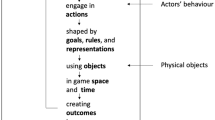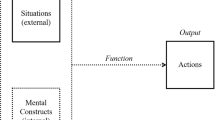Abstract
If we understand social psychology to be an area where sociology and psychology overlap, or more precisely where we try to explain interaction on the basis of psychological and sociological propositions and concepts, we have singled out a field that should be quite challenging not only in theory and method but in the fundamental questions it raises for both sociology and psychology. Actually, the discipline is not that well integrated and is constituted by such disparate approaches as reinforcement theory, field theory, role theory, small group theory, game theory and psychoanalysis. Many sociologists have abandoned the field altogether. Nor have the proponents of these sub-fields made much effort to consolidate, integrate or reconcile their methodologies. Epistemological questions have been notably absent and only now have arguments from the philosophy of science point of view reemerged to revive the critical and potentially fruitful methodological discussions of earlier theorists (F. Allport; Lewin; Mead; Simmel) and their more recent followers (Homans; Malewski).
After considering epistemological problems dealing with the generality of theory and explanation, behavioristic vs. action approaches, operational and model structural implications, we want to argue for a better understanding of social system variables besides those of the personality system and of system theory in general. In our discussion we use examples from the area of sport because it composes a complex system, that is not too difficult to observe at the same time that it shows in relative clarity all of the different levels of an action system. It has, furthermore, many features of an almost experimental design in a natural field. In so far it is a model area to allow due consideration for our demand that social psychology rediscover the method of field studies. This will help to reverse the trend characterized by a general neglect of theory that has resulted from behavioral dogmatism and the expedience of research pragmatism based mostly on two-variable linear models. This is not to say that we disfavor rigorous research design and data analysis - to the contrary. We just want it to be done in the context of broader theoretical concerns and in clear recognition of the pitfalls of operationalism and the merits of action theory.
Similar content being viewed by others
Bibliography
Allport, F. H., ‘The Contemporary Appraisal of an Old Problem’, Contemporary Psychology 6 (1961) 195–196.
Allport, G. W., Personality and Social Encounter, Beacon, Boston, 1960.
Baron, R. S., et al., ‘Group Consensus and Cultural Values as Determinants of Risk Taking’, Journal of Personality and Social Psychology 20 (1971) 446–455.
Bertalanffy, L. V., General System Theory, Braziller, New York, 1968.
Bickman, L. and Henchy, T. (eds.), Beyond the Laboratory: Field Research in Social Psychology, McGraw-Hill, New York, 1972.
Borger, R. and Cioffi, F. (eds.), Explanation in the Behavioral Sciences, Cambridge University Press, Cambridge, 1970.
Bridgman, P. W., The Logic of Modern Physics, Macmillan, New York, 1928.
Carnap, R., Testability and Meaning, Yale University Press, New Haven, 1954 (Orig. 1936–1937).
Deutsch, M. and Krauss, R. M., Theories in Social Psychology, Basic Books, London and New York, 1965.
Gabler, H., Leistungsmotivation im Hochleistungssport, Hofmann, Schorndorf, 1972.
Goffman, E., Encounters, Bobbs-Merrill, Indianapolis, 1961.
Hempel, C. G., ‘On the “Standard Conception” of Scientific Theories’, in M. Radner and S. Winokur (eds.), Minnesota Studies in the Philosophy of Science, IV, University of Minnesota Press, Minneapolis, 1970, pp. 142–163.
Homans, G. C., The Human Group, Harcourt, Brace & World, New York, 1950.
Homans, G. C., Social Behavior: Its Elementary Forms, Harcourt, Brace and World, New York, 1961.
Homans, G. C., ‘Bringing Man Back In’, American Sociological Review 29 (1964) 809–818.
Lenk, H., Leistungsmotivation und Mannschaftsdynamik, Hofmann, Schorndorf/Stuttgart, 1970.
Lenk, H., ‘Trees, Tournaments and Sociometric Graphs’, International Review of Sport Sociology 6 (1971) 175–204.
Lenk, H., Erklärung, Prognose, Planung, Rombach, Freiburg, 1972.
Lewin, K., Field Theory in Social Science, Harper & Row, New York, 1951.
Lüschen, G. (ed.), ‘Kleingruppenforschung und Gruppe im Sport’, Westdeutscher Verlag, Köln, Opladen, 1966 (Sonderheft 10 der Kölner Zeitschrift für Soziologie und Sozialpsychologie.
Lüschen, G., ‘Small Group Research and the Group im Sport’, in G. Kenyon (ed.), Sociology of Sport, Athletic Institute, Chicago, 1969, pp. 57–66.
Lüschen, G., ‘Association, Cooperation and Contest’, Journal of Conflict Resolution 14 (1970) 21–34.
Lüschen, G., ‘The Interdependence of Sport and Culture’, in G. Lüschen (ed.), The Cross-Cultural Analysis of Sport and Games, Stipes, Champaign, Ill., 1970, pp. 85–99 (orig. 1967).
Lüschen, G., ‘Psychologischer Reduktionismus und die informellen Beziehungen im Wettkampf’, in G. Albrecht et al. (eds.), Soziologie, Westdeutscher Verlag, Opladen, 1973, pp. 753–759.
Luhmann, N., ‘Einfache Sozialsysteme’, Zeitschrift für Soziologie 1 (1972) 51–65.
Malewski, A., Verhalten und Interaktion (orig. Polish 1964), Mohr, Tübingen, 1967.
Martens, R. and Petersen, J., ‘Group Cohesiveness as a Determinant of Success and Member Satisfaction in Team Performance’, International Review of Sport Sociology 6 (1971) 49–62.
McClelland, D. C., The Achieving Society, VanNostrand, New York, 1961.
McGuire, W., ‘The Yin and Yan of Social Psychology: 7 Koan’, Journal of Personality and Social Psychology 26 (1973) 446–456.
Mischel, R. (ed.), Human Action, Conceptual and Empirical Issues, Academic Press, New York and London, 1969.
Ore, O., Graphs and Their Uses, Random House, Singer, New York, 1963.
Piaget, J., Structuralism, Basic Books, New York, 1970.
Roberts, G., ‘The Effect of Risk Taking Disposition, Presence of Others, Cooperation and Competition on Risk Taking and Performance’, Ph.D. Thesis, University of Illinois, Urbana, 1969.
Salmon, W. C., Statistical Explanation and Statistical Relevance, University of Pittsburgh Press, Pittsburgh, 1971.
Seppänen, P., ‘Die Rolle des Leistungssports in den Gesellschaften der Welt’, Sportwissenschaft 2 (1972) 133–155.
Sher, G., ‘Causal Explanation and the Vocabulary of Action’, Mind 82 (1973) 22–30.
Simmel, G., Soziologie, Duncker und Humblot, Berlin, 1958.
Stegmüller, W., Probleme und Resultate der Wissenschaftstheorie und analytischen Philosophie, Springer, Berlin, Heidelberg und New York, 1969 I, 1970 II.
Stone, G., ‘Begriffliche Probleme in der Kleingruppenforschung’, in G. Lüschen (ed.), Kleingruppenforschung und Gruppe im Sport, Westdeutscher Verlag, Opladen, 1966, pp. 44–65.
Tripplett, N., ‘The Dynamogenic Factors in Pacemaking and Competition’, American Journal of Psychology 4 (1898) 507–533.
Watson, D., ‘Reinforcement Theory of Personality and Social System’, Journal of Personality and Social Psychology 20 (1971) 180–185.
Whyte, W. F., Street Corner Society, University of Chicago Press, Chicago, 1943.
Author information
Authors and Affiliations
Additional information
The authors would like to thank Donald Dixon for his helpful criticisms.
Rights and permissions
About this article
Cite this article
Lenk, H., Lüschen, G. Epistemological problems and the personality and social system in social psychology. Theor Decis 6, 333–355 (1975). https://doi.org/10.1007/BF00136201
Issue Date:
DOI: https://doi.org/10.1007/BF00136201




